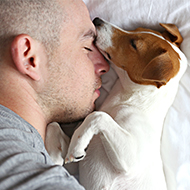Studies affirm benefits of veteran assistance dogs for PTSD

Researchers reported that veterans benefit significantly from dog ownership.
A series of US studies have reaffirmed the benefits of assistance dog programmes for veterans experiencing PTSD.
In a news release shared by the Royal Society for the Blind (RSB), it was found that seven scientific studies, published in peer-reviewed journals, found that assistance dog training and partnering produced moderate-to-significant lowering of PTSD symptom scores.
Cheis Diefenthaler, executive director of Assistance Dogs International (ADI), discussed the studies: “Assistance dogs improve the lives of countless thousands of veterans around the world by helping with practical tasks, enhancing independence, and boosting wellbeing, dignity and confidence.
“These studies indicate that properly trained assistance dogs are both lifesaving and life-changing for veterans suffering from PTSD. They are proof that assistance dogs have a major role to play in the treatment, rehabilitation, and support of military veterans with severe combat trauma.”
All seven of the studies discovered reduced PTSD symptoms after participants completed service dog handling instruction, and two other studies found long-term reduction in symptoms, using follow-up measures.
In four of the studies, wherein control groups were used, it was found that symptoms of the assistance dog participants reduced more than those of the control group.
Rick Yount, founder and executive director of ADI member Warrior Canine Connection, commented: “These seven scientific examinations provide the long-awaited evidence that assistance dogs are both popular and effective at reducing trauma symptoms and improving the quality of life for our veterans.
“They also indicate that partnering with an assistant dog can enhance the perception of standard trauma treatment.
“PTSD is projected to remain a chronic and debilitating condition for thousands of veterans. It is imperative that assistance dogs for veterans with PTSD be fully integrated into military and veteran trauma care.”



 The RCVS has announced a new version of its 1CPD mobile app, with enhanced features for veterinary surgeons and veterinary nurses to record their continuing professional development.
The RCVS has announced a new version of its 1CPD mobile app, with enhanced features for veterinary surgeons and veterinary nurses to record their continuing professional development.